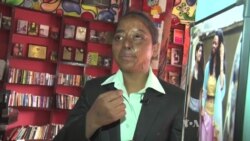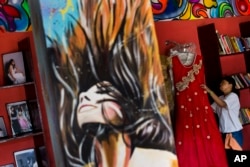India, a country grappling with violence against women, has one of the highest rates of acid attacks in the world – about 350 cases were officially reported in 2014.
Their faces scarred, most acid attack survivors virtually “disappear” from society. But a cafe in the tourist hub of Agra, Sheroes Hangout, is helping them return to the mainstream by winning social acceptance for them.
Dolly Kumari, 15, never ventured out for two agonizing years after a man who was 20 years older her senior chucked acid on her face for spurning his advances. She says when she first came to the café, “I had covered my face fully, I did it in a way that even my eyes did not show.”
Regained confidence
But after serving and meeting customers for several months, Dolly has regained confidence, and has vowed never to hide behind a “dupatta” (a piece of cloth worn around the neck in South Asia). She wants to return to her studies.
“I have so much courage I can say anything to anyone. I, too, have a life,” Dolly says.
New Delhi based nongovernmental group, Stop Acid Attacks, that works with acid attack survivors, launched the cafe a year ago after making little headway in getting jobs and rehabilitating victims like Dolly.
Most of the women are attacked over domestic or property disputes, or for rejecting sexual advances or marriage proposals.
Isolation forced upon them
Alok Dixit, founding member of the group, says families and neighborhoods worsen the plight of the women with attitudes that compel them to become virtually invisible.
Dixit says the isolation forced on them unwittingly by society is perhaps even more painful than the agony they suffered at the time of the attack.
At Sheroes, he hopes to change the perception that a disfigured face spells ruin.
“This is the notion we want to break. Your face is not all. You cannot ruin a victim’s life by ruining their face. Life is beyond how you look,” he says.
The café is an effort to spread that message softly – not through sloganeering and protests, but by bringing victims face to face with the public.
They gain confidence through interacting with the nearly 10,000 cafe customers, many who have visited after hearing about it through social media.
Social acceptance has given a renewed sense of purpose to Rupa, whose stepmother threw acid on her in 2008.
After the attack, she hid herself in the house. But after working at the café, she said she is nurturing dreams of becoming a fashion designer – clothes she designs are displayed at the café.
'Society reaches out to us'
“People come to meet us, they want to know our story, they sit and talk to us. At one time, we were alone even within our families, now society reaches out to us,” she says.
To draw in people from all strata of society, the menu at the cafe does not set a price, letting customers pay what they want.
There are no official figures for acid attacks in India, but it is estimated there could be 1,000 a year in a country where acid is easily available despite laws implemented in 2013 to regulate its over the counter sale.
Seventy percent of the acid attacks target women and most are against those between ages 21 to 30.
Laws to punish offenders have been made tougher, but it is unclear if that has helped stem acid attacks.
What is clear is that the veil is slowly being lifted from a crime whose horrific implications few saw earlier because victims went into hiding.
Family attacked
Neetu Mahour, 23, encountered the world at the café for the first time since she was 3 years old when she was nearly blinded in an acid attack by her father. He also targeted her infant sister and her mother. The infant died, and now Neetu and her mother work at the café.
Neetu never went to school or played with other children. “People considered us different, no one spoke to us or invited us.”
Now she says life is better in every way, whether it is money, the way she dresses, eats or lives. People, she says, no longer make comments when she passes by.
The women are encouraged to be proud of the way they look, their faces and stories are plastered on the walls.
“We want to redefine beauty,” Dixit says.
The heartening response to Sheroes has encouraged Stop Acid Attacks to plan three more ventures in New Delhi, Lucknow and Udaipur. It is a small but inspirational step in a country that is stepping up the fight to tackle violence against women.













